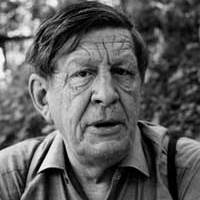In Memory of W.B. Yeats by W.H. Auden: Summary
The poem In Memory of W.B. Yeats, by W.H. Auden is divided into three sections of varying lengths which form separate poetic units within the poem. The relationship among these units is not very close and organic, as each section is based on somewhat independent strains of thought.

W.H. Auden (1907-1973)
Section I of the poem describes, in the dramatic setting, the death of Yeats. Yeats died on a day when it was bitter cold, brooks were frozen and airports were deserted. Auden looks upon the death of Yeats as an ordinary occurrence. His death did not affect the order of things. And here Auden introduces an idea which is central to the theme of the poem; a poet’s work ultimately becomes independent of him because he had no control over the interpretation which posterity will give it. He becomes what his readers make him. Despite the fact that the general motion of the first section is toward a valorization of the work and the diminishment of the author, the refrain at the close of the first section returns to the subject of the elegy to the poem's center with a conventionally appropriate tone.
Section II introduces another strand of thought. Here, Auden’s expression becomes changed with psychological overtones. From the description of the mere physical death of Yeats, Auden proceeds to examine the psychological implications of the work of a poet and assesses the worth of poetry in terms of modern psychology. Despite the great poetry of Yeats, Ireland had remained the same. Poetry fails to produce any revolutions or to make changes in society. What lives after a poet in his style; his manner of saying rather than the subject or the content of his poetry. And this style, manner and language of the poet come to dwell in the subliminal depth of the human psyche, ‘where executives would never want to temper’ it. The uniqueness of poetry lies in the manner in which it objectifies the human condition.
In section-III, the poet universalizes the tragedy of Yeats by relating it to the wider theme of the artist in society. Time, which is indifferent to the faults of character or physical charm ‘worships language’. Time does not care for what the poet said, but for something about the way he said it. The language of a poet redeems his views and oddity of character. The second half of section- III deals with the imminence of world war-II. The time of Yeats’ death was a terrible one. “It was a time of ‘intellectual disgrace’ sans pity and compassion.
It is in the final section of the elegy that Auden expands on the meaning of poetry's "way of happening." In rhymed trochaic tetrameter quatrains, Auden first lays Yeats to rest and then reinvigorates him as a model for poets. The first stanza of this section is the final farewell to Yeats, who is here called "the Irish vessel." The death of Yeats, as becomes clear in Auden's development of the poem in the second and third stanzas of this section, is accompanied not only by a figurative public unrest as was described in the poem's first section, but by literal international contention.
Cite this Page!
Sharma, Kedar N. "In Memory of W.B. Yeats by W.H. Auden: Summary." BachelorandMaster, 21 June 2017, bachelorandmaster.com/britishandamericanpoetry/in-memory-of-yeats-summary.html.
